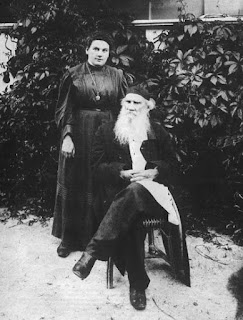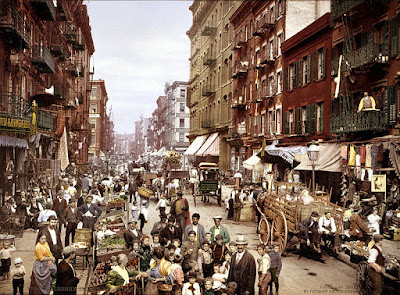Leo Tolstoy
Alexandra
Tolstoy, hija del autor
León Tolstoi, habla sobre la vida en la
Rusia de principios del siglo 20. Recuerda los juegos que tenía con su
padre y hermano menor y su complejo de inferioridad. León Tolstoi era popular entre la gente común y visitado por
personalidades. Tolstoi fue
excomulgado por la iglesia ortodoxa. Alexandra
manejaba la Fundación Tolstoy, en la
ciudad de Nueva York, que ayudaba a
refugiados de Europa del Este. En
vocabulario: boisterous, hurl y lavish
“… recuerdo que éramos 13 chicos…”
“… las posesiones y el status significaban muy poco
para él…”
“… when he was
71 the church excommunicated him. He had stated that they had perverted the
message of Christ….”
Aunque Alexandra
compartió la creencia de su padre en la no violencia, sintió que era su deber
participar en los eventos de la Primera
Guerra Mundial y se desempeñó como enfermera en los frentes turco y alemán.
Esto la llevó a ser gasificada e internada en el hospital. Después de la
guerra, trabajó en una edición de los escritos de su padre. Sin embargo,
después de permitir que los rusos disidentes se reunieran en su casa de Moscú, los bolcheviques la arrestaron cinco veces y en 1920 la enviaron a
prisión por un año.
 |
| Leo Tolstoy with his daugther Alexandra |
Se le dio permiso para abandonar la Unión Soviética en 1929, y se instaló
en los Estados Unidos, donde dio
conferencias y trabajó como granjera. Algunos años después de esta vida, fue
visitada por Tatiana Schaufuss, una
vieja amiga que había pasado varios años en prisión y exiliada en Siberia. Juntas, en 1939, establecieron la Fundación Tolstoi.
Tolstoy´s daughter speaks about his famous father
Alexandra Tolstoy remembers his family life, the love of his father,
the great Russian writer, his mother, and his brother.
Not far from New York City is the Tolstoy Foundation. It helps immigrants
from Eastern Europe. Running it is Alexandra Tolstoy, 86 years old,
daughter of Leo Tolstoy, and the
twelfth of his thirteenth children.
Leo Tolstoy, the Russian
writer, was a towering mountain in the world of literature. His novels alone
would have raised him, in particular War
and Peace and Ana
Karenina. But he
was also a prestigious thinker, philosopher and religious man. Alexandra Tolstoy´s memories of his
father start at the time when most of his novels were already written. His
dissolute young manhood was far behind him and his reputation was established
well beyond the borders of Russia.
“I remember our
family when we were 9 but altogether there were 13 children And 4 of them died
before and then my little brother Vania
died later. So after that we were 8 and now I´m the only one left.”
At the end of
the 19 century the Tolstoy´s family
lived on a country state, Yasnaya Polyana,
a hundred and thirty miles south of Moscow.
He was count Tolstoy, with
considerable land and fortune, but possessions and status meant little to him.
His personal qualities as much as his literary ones made him a kind of magnet,
attracting the curious, the respectful and the ardent from far and near.
When his visitors
left the eminent writer became a boisterous
father and hurled himself into
games with his children.
“He used to put
us on a carpet and then we would sit on the carpet and he would go around dragging
us on this carpet all around the room, the dining room. And then sometimes he
would play another game. There were big baskets instead of a luggage. Enormous
baskets. They don´t use them now. So he would put us into that box and carried us
around. And then put us to some dark corner and say “well, guess where are you?”
Sometimes we would, sometimes we wouldn’t but that was also lots of fun. We
would take turns, my little brother and I. The other brothers were too big”
Alexandra was an unwanted child. When her mother Sonia was pregnant she had tried to abort herself by jumping off a
bureau. Later Sonia lavished her affection on Vanishka, Alexandra´s little brother. Alexandra
childhood was difficult and often lonely.
“Of course they
don´t know what I felt, that I was not wanted and when my mother gave all her
love to the little boy, Vanishka. Sometimes
I felt a little hurt but I loved Vania
so much that I understood that he deserved all the love. And somehow it didn´t
hurt me much. Sometimes a nurse when she would give some candies to the little
boy and she would forget me I would get a little hurt but then Vania would come and give me his candy. So
that was so much for me. It hurt but not too much because I understood. They
don´t know how. Maybe I couldn´t understand it thoroughly. Maybe I just felt it
somehow. They only thing with me is that I had a terrible inferiority complex. It
was very difficult for me to get rid of it.”
But between Alexandra and her father there was an
open-hearted love, a closed and direct understanding.
“He was always a
friend. I could always go with all my troubles, with all my headaches. The more
I lived the more I understood him…”
“… Once I had a
proposal to get married and I said to him “I don´t want to get married”…
“… she became
his secretary and tried to hand-copy his writing but it was difficult. Only the
ones who knew him and his ideas could understand…”
“… when he was
71 the church excommunicated him. He had stated that they had perverted the
message of Christ….” (7 minutes)
Recibí una
traducción de este documento suscribiéndote
al blog
Para
saber
De 1846 a 1940, cerca de 55 millones de europeos
hicieron las maletas y buscaron una nueva vida en el extranjero, principalmente
en los Estados Unidos y América del Sur.
Se vaciaron regiones enteras, lo que obligó a los gobiernos de Viena a Praga a usar propaganda y
castigo para evitar la propagación de la llamada "fiebre de América". Sin embargo, las calles
de América no siempre estaban llenas
de oro, y muchos emigrantes regresaron a casa, fundidos y desilusionados.
 |
| Mulberry Street, NYC, 1900 |
Vocabulario
Boisterous: noisy, energetic, and cheerful.
"A group of
boisterous lads".
Hurl:
throw or impel (someone or something) with great force.
"Rioters hurled a brick through the
windscreen".
Lavish: give something in generous or extravagant quantities.
"The media
couldn't lavish enough praise on the
film".
Artículos
relacionados
La razón del asombroso hecho de que la mayoría de
los obreros se sometan a un puñado de ociosos pasa siempre… Una
carta para un hindú
Ivan
Ilych había sido colega de los caballeros presentes y
todos lo apreciaban. Había estado enfermo durante algunas semanas con una
enfermedad que se decía era incurable... La
muerte de Iván Ilyich
Iván
Ilyich vive la vida como la mayoría de la gente que
conoce: trata de escalar su status en lo social, soporta un matrimonio con una
mujer a la que encuentra demasiado exigente… Iván Ilyich
Fuentes
During
Last Mass Migration, Europeans Were the Immigrants, Simon Worrall, National
Geographic
No comments:
Post a Comment